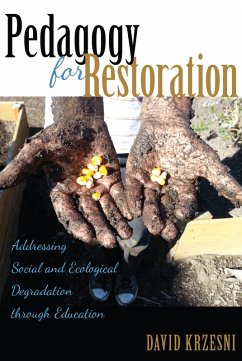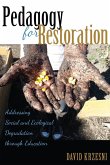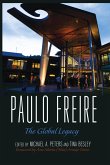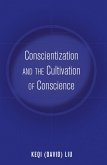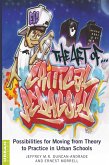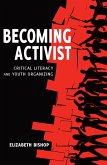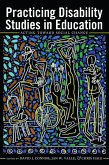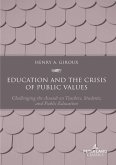Dieser Download kann aus rechtlichen Gründen nur mit Rechnungsadresse in A, B, BG, CY, CZ, D, DK, EW, E, FIN, F, GR, HR, H, IRL, I, LT, L, LR, M, NL, PL, P, R, S, SLO, SK ausgeliefert werden.
(Jeff Duncan-Andrade, Associate Professor, Raza Studies & Education, San Francisco State University)
«David Krzesni's Pedagogy for Restoration is a deeply personal work that raises important questions about the relationship between social and ecological degradation. The book is incredibly timely as such questions and examinations are proving to be among the most trenchant of our time. Krzesni's focus on the politics of hope, empathy, and moral education not only provides a unique frame through which to consider the structures of oppression and liberation but also offers students of education and social change what they have long asked for - a pedagogy of restoration.»
(Sandy Grande, Associate Professor, Co-Chair, Education Department, Director, Center for the Comparative Study of Race and Ethnicity, Connecticut College)
«At a time where much looks bleak for people and their relationships with themselves, others, and with the earth, we need narratives of renewal, purpose, and possibility. We need guides to remind ourselves of our own potential to heal broken relationships. In Pedagogy for Restoration, David Krzesni is such a guide. This book will challenge your identity as an educator and provide you with pathways for your own revitalization in connection with others.»
(David A. Greenwood, Canada Research Chair in Environmental Education, Director, Centre for Place and Sustainability Studies, Faculty of Education, Lakehead University)
«David Krzesni's Pedagogy for Restoration is a well-researched piece of literature.... He suggests that education can be a powerful tool for effecting structural change, remaining deeply sensitive to mechanisms of oppression and discrimination, the power of language, and the need for a hope-based, informed approach to social change.... Krzesni cites research on human qualities such as empathy and altruism to highlight people's innate propensity for caring and responsibility. He believes in the human capacity for change, and believes that, through structured guidance and governance, positive qualities can be emphasized and people can be encouraged to act on these characteristics. While acknowledging the limitation to human love, empathy, and prosocial behavior, Krzesni argues that, with the right social conditions and with practices of nurturing and empowerment (especially in formative years), people's capacity to carry out a 'pedagogy for restoration' is possible.»
(Samuel P. Oliner, Co-author (with Pearl Oliner) of The Altruistic Personality and Toward a Caring Society; Author of Altruism, Intergroup Apology, Forgiveness, and Reconciliation and The Nature of Good and Evil)
«In this book by David Krzesni, a powerful new moral voice addresses the intersection of environmental education, social justice, and human rights. Boldly affirming both critical social theory and human moral potentials to overcome every exclusion, this bracing and exacting fugue freshly points out melodies of deepest humanity, hearing voices that unite ecology and people in powerful harmonies. It should be required/inspired reading (listening, singing) for the next generation of critical socio-environmental change agents.»

